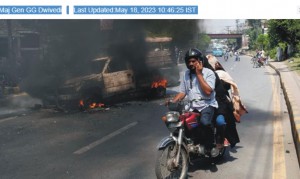Whatever the endgame be, Pakistan is bound to slip deeper into the abyss, haunted by the stark reality of becoming a ‘failed state’
A motorcyclist drives past a burning vehicle set on fire by angry supporters of Pakistan’s former prime minister Imran Khan, in Lahore on 11 May, 2023. AP
High-voltage spectacle leading to the arrest of former Pakistan prime minister Imran Khan by the Rangers on 9 May 2023 at the Court House in Islamabad resulted in turmoil across the country. The intensity of violence unleashed by the workers of Imran’s party, Pakistan Tehreek-e-Insaf (PTI), was well beyond expectations. The rampage resulted in the loss of over a dozen lives and colossal damage to the property, including that of military establishments. Despite the ruthless crackdown by security forces, the environment continues to be volatile.
The explosive situation took another dramatic turn two days later when on 11 May, the Supreme Court of Pakistan (SC) ordered Imran Khan’s immediate release, calling his arrest to be illegal. While Imran’s followers rejoiced, the government accused the judiciary of acting politically and favouring the former prime minister. The SC decision came as a jolt even for the army. The next very day, Islamabad High Court granted bail to Imran Khan along with two weeks’ reprieve from arrest in the Al-Qadir trust case. It also provided him immunity from arrest in any case filed after 9 May. Immediately on his release, Imran Khan went ballistic, squarely blaming the Army Chief General Asim Munir for destroying the nation and creating chaos.
The gravity of the prevailing situation reverberates the outrage that followed former prime minister Benazir Bhutto’s assassination in 2007. Ongoing unrest probably is the worst since 1971, which ended up in the dismemberment of Pakistan. The current political calamity could not have come at the worst time when Pakistan is in the grip of a serious economic crisis, almost on the verge of bankruptcy.
In its 75 years of existence, for half the time Pakistan has been ruled by army generals. Even during the times, the civilian government was in place, the army continued to exercise effective control by proxy. For that matter, Imran Khan also wears the tag of the selected prime minister as the army played a key role in his coming to power in 2018, orchestrating the dismissal of the Nawaz Sharif government on corruption charges.
Going by the history of civil-military relations in Pakistan, no civilian government has been able to complete its full term. So was the case with Imran Khan who fell out of favour with the then Army Chief General Qamar Bajwa, his benefactor, over the appointment of DG ISI (Director General Inter Service Intelligence). While Imran Khan wanted Lt Gen Faiz Hameed to continue as the head of ISI and subsequently take over as the Chief, General Bajwa overruled the prime minister and appointed Lt Gen Nadeem Anjum as the DG.
The army ultimately got rid of Imran Khan last April, by engineering his toppling through a ‘no confidence motion’ paving the way for Shehbaz Sharif to become the prime minister. After his ouster, Imran Khan vociferously took up an anti-army stance, gaining considerable public popularity in the process. He went on to level allegations against Major General Faisal Nasser, head of counter-intelligence in ISI for an attempt on his life. Imran Khan has been demanding early elections in a bid to cash in the favourable public sentiments. However, his coming to power is not in the army’s interest. General Asim Munir, in fact, has a personal grudge against Imran Khan for removing him from the post of DG ISI prematurely when he reportedly initiated an investigation of corruption charges against Bushra Bibi-Imran’s wife.
Unprecedented public anger is directed against the Pakistan Army (Chief) fueled by hardships faced by the common person in the wake of harsh economic conditions, given that military continues to maintain a lavish lifestyle. There are also reports about dissidence within the army, evident from a major military reshuffle wherein Lt Gen Salman Ghani commander of the Lahore-based Corps stands replaced by Lt Gen Fayyaz Shah. Reports of purges against the pro-Imran elements in the army have also surfaced.
While Pakistan Army may have a poor track record having lost all the wars it fought, however, at home it has been always victorious. Currently, Army may appear to be on the back foot but is expected to act resolutely here on, evident from the statements of the army chief. As generals handle the nation’s defence and foreign policies, lately even the economic affairs, Pakistan Army maintains direct channels with highest rung policymakers in China, US and Gulf nations. Therefore, as long as Rawalpindi serves the interest of Beijing and Washington, it matters little as to who is at the helm in Islamabad.
India needs to be wary of the state of affairs in Pakistan, given the probability of spillover. Pakistan’s military is known to escalate situations on the borders to divert public attention at home whenever there is internal upheaval. More so, painting India as an existential threat serves Pakistan Army well, both to justify its relevance and rally public support. There are already reports of ‘Border Action Teams’ gearing up for hostile actions across the LoC.
The political alignments in Pakistan stand well defined. The Shehbaz Sharif government is backed by the army on one side and Imran Khan’s PTI with the support of SC on the opposite end. Round one has definitely gone in Imran’s favour. Despite Imran Khan’s call for nationwide protests on 17 May to protect the nation’s constitution, the establishment dealt with the situation in a heavy-handed manner. Cases were registered against Imran Khan under the Army Act – Sections 59 and 60; the penalty being life imprisonment or death if found guilty.
Pakistan teetering on the edge is a cyclical phenomenon, courtesy of its self-implosion mechanism. This time around, the Islamic Republic is in for a long haul; the battlegrounds being the streets and the judicial courts. People’s protests are expected to run out of steam in due course. Imran in all likelihood will be tried by the army court, convicted and jailed with the possible option of going into exile. Whatever the end game be, Pakistan is bound to slip deeper into the abyss, haunted by the stark reality of becoming a ‘failed state’.


